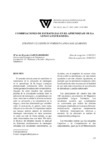Mostrar o rexistro simple do ítem
Combinaciones de estrategias en el aprendizaje de la lengua extranjera
| dc.contributor.author | García Herrero, María Mercedes | es_ES |
| dc.date.accessioned | 2014-04-30T10:58:23Z | |
| dc.date.available | 2014-04-30T10:58:23Z | |
| dc.date.issued | 2012 | es_ES |
| dc.identifier.citation | Revista Galego-Portuguesa de Psicoloxía e Educación, 2012, 20: 133-153. ISSN: 1138-1663 | es_ES |
| dc.identifier.issn | 1138-1663 | es_ES |
| dc.identifier.uri | http://hdl.handle.net/2183/12113 | |
| dc.description.abstract | [Resumen] El presente artículo pone de manifiesto la importancia de la utilización de estrategias en el aprendizaje de la lengua extranjera proporcionado información sobre diversas investigaciones llevadas a cabo en este ámbito. Algunos de estos estudios han aportado pruebas de la vinculación existente entre la aplicación de estrategias y un aprendizaje con éxito, otros han revelado la relación existente entre su utilización y la competencia en la lengua y otros han demostrado que variables como la motivación, el género, entre otros, influyen en su elección. Es importante resaltar que aunque seamos capaces de identificar estrategias individuales en raras ocasiones se usará una sola de forma aislada, ya que están relacionadas unas con otras. Por tanto, el objetivo del presente estudio es analizar las diferentes combinaciones de estrategias utilizadas por estudiantes universitarios, ya titulados, con el propósito de conocer cómo llevan a cabo su aprendizaje y de esta manera ayudarles a ser más eficaces. Igualmente, se pretende que los aprendices recapaciten sobre la utilización de estos recursos con la finalidad de que sean más conscientes de sus procesos de aprendizaje y puedan optimizarlo. Los participantes del estudio han sido 340 estudiantes universitarios de Magisterio especialidad Lengua Extranjera. Los estudiantes tuvieron que cumplimentar un cuestionario que incluía las distintas estrategias clasificadas en 6 grupos (Directas: memorización, cognitivas, compensación e Indirectas: metacognitivas, afectivas y sociales). Se ha efectuado un análisis de conglomerados jerárquicos. Los resultados indican que las categorías Cognitiva y de Compensación se dan conjuntamente, igual que la de Memorización y Social. En cambio la categoría Afectiva forma un solo grupo, aparece de manera independiente, al igual que la Metacognitiva. | es_ES |
| dc.description.abstract | [Abstract] This paper explains the importance of the language learning strategy use in foreign language learning giving information about several different studies which have been conducted in this area. Research has extensively documented the relationship between the language learning strategy use and successful language learning. A large volume of studies have revealed that selecting appropriate strategies could enhance the learners’ performance of second language learning, and others have claimed that variables such as motivation and gender, among others, seem to influence on language learning strategy choices in studying a language. It is important to mention that though we can identify single strategies they won´t be used in isolation since they are interrelated. Therefore, the main objective of this study was to determine the different combinations of strategies in studying foreign language, used by graduate students in order to know their learning process and help them to be more efficient. Thus, it is expected that learners will think about using language learning strategies in their foreign language learning so that they can be more conscious about their learning and can improve it. The participants were 340 graduate learners studying English as foreign language. Subjects filled out a questionnaire that included 6 different groups of strategies divided into (Direct: memory, cognitive, compensation and Indirect: metacognitive, affective and social). It´s been used a cluster analysis. The results revealed that Cognitive and Compensation categories occur at the same time, the same as Memory and Social categories. On the other hand, Affective category forms one group, appears independently, as Metacognitive category | es_ES |
| dc.language.iso | spa | es_ES |
| dc.publisher | Universidade da Coruña | es_ES |
| dc.subject | Estrategias | es_ES |
| dc.subject | Aprendizaje | es_ES |
| dc.subject | Lengua extranjera | es_ES |
| dc.subject | Strategies | es_ES |
| dc.subject | Learning | es_ES |
| dc.subject | Foreign language | es_ES |
| dc.title | Combinaciones de estrategias en el aprendizaje de la lengua extranjera | es_ES |
| dc.title.alternative | Strategy clusters in foreign language learning | es_ES |
| dc.type | journal article | es_ES |
| dc.rights.accessRights | open access | es_ES |






